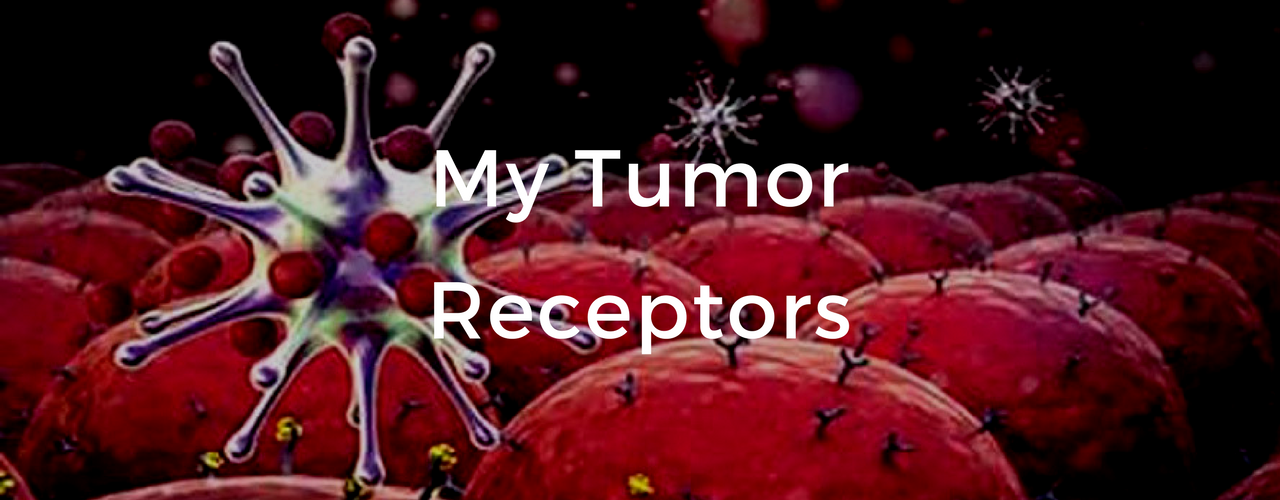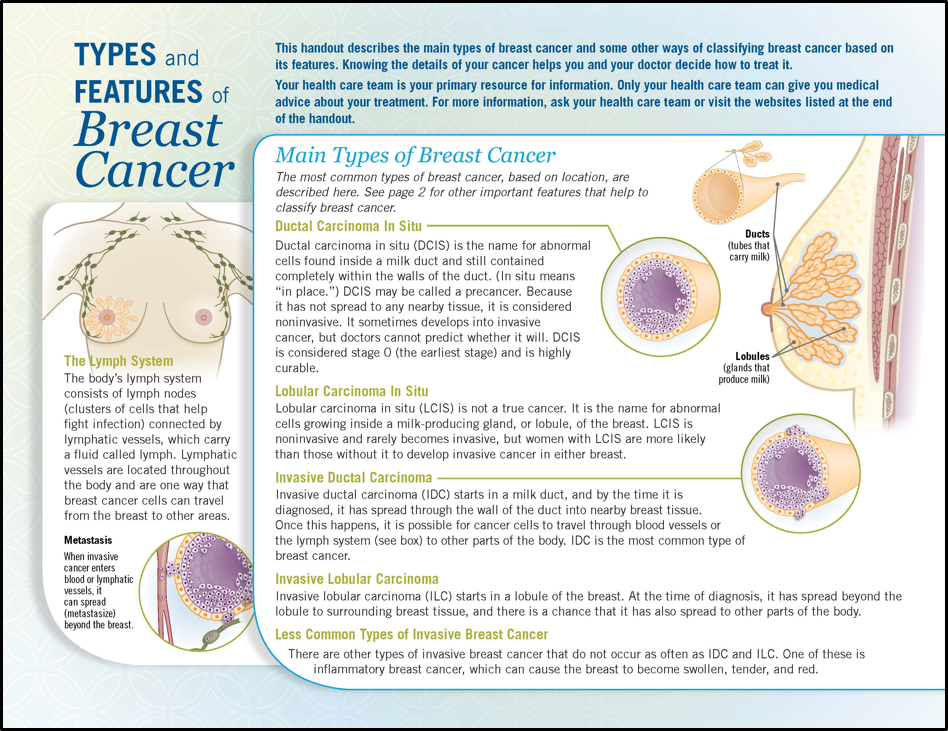Questions for your Breast Surgeon and Medical Oncologist:
- What receptors does my tumor have?
- What type of treatment will I need?
- May I have a copy of all my pathology reports?
- Do my receptors already suggest I need chemotherapy?
- Do my receptors show I will need hormonal therapy?
- Would I benefit from neoadjuvant chemotherapy?
What are Breast Cancer Receptors?
Once a breast biopsy is determined to be invasive by a pathologist under the microscope, they will automatically run at least three more tests on the same tissue to determine what “receptors” are present. Receptors are tiny proteins on the surface of the cells that act like “light switches” that can turn cancer cell growth “on” or “off.” The Estrogen receptor (ER), Progesterone receptor (PR), and HER2 receptor results are incredibly important for you to know and understand. Receptors are different than “grade” and “stage” as outlined in the diagram below. All are different pieces of the breast cancer puzzle that your physicians will assemble to determine the best therapy for you. In the case of receptors, these are key determinants as to whether you will or will not benefit from hormonal therapy (pills) or chemotherapy. The receptors involving a precancerous lesion such as DCIS have different implications and are addressed in our DCIS course.
Why are Receptors so important?
When estrogen in your body interacts with an “Estrogen Receptor Positive” cancer, it tends to flip the ER switch of the cancer cells to the “on” or “grow” position. The same can be said for the “Progesterone Receptor.” The HER2 receptor is a little different in that it is not one that interacts with a hormone floating in your body. If the HER2 receptor is found to be “positive” (HER2-Positive) these cancer cells have too many of these types of “on” switches and are always pushing the cancer cells to grow. There are great treatments available for all combinations of cancer receptor types. We outline this briefly below. This information is critical in guiding you to further therapies that may be needed before or after surgery, such as chemotherapy or hormonal therapy. You should try to understand this aspect of your cancer care from the outset. Make sure to review our other courses to learn what you need to know about the treatment options for your unique type of breast cancer.
Receptors that suggest Hormonal Therapy
Estrogen Receptor Positive (ER+) tumors are always treated with hormonal therapy. Usually, these types of medications (pills) are taken for a total of 5 to 10 years. It is still possible that one may need chemotherapy in addition to hormonal therapy. If you are Progesterone Receptor Positive (PR+) then you will likely need hormonal therapy, even if you are ER-. The Estrogen Receptor plays a much more important role in cancer care than the Progesterone Receptor. Learn more about “Hormonal Therapy“ at our video lesson (here).
Receptors that suggest Chemotherapy
Determining if you need chemotherapy is a very complex decision process and is primarily driven by your medical oncologist. Your “receptor pattern” is a key piece of information that is known early in your breast cancer journey. In about 30% of patients with invasive breast cancer, the receptor pattern alone can strongly suggest that chemotherapy will be needed, regardless of what is found at surgery. We list a few of the more common “chemotherapy receptor patterns” below. Many factors, including a large cancer and cancer that is present in the lymph nodes, also point someone towards chemotherapy. Take our video lesson on “Will I Need Chemotherapy“ (here). Often if someone needs chemotherapy, they will likely benefit also from hormonal therapy after chemotherapy if their estrogen receptor is positive.
Estrogen Receptor Negative (ER-) tumors do not respond to anti-estrogen oral medications that are essential for treating estrogen receptor positive (ER+) tumors. Quite simply, patients with ER-negative tumors will benefit from chemotherapy if they are healthy enough to tolerate it. ER-negative tumors are more aggressive cancers but respond very well to chemotherapy. This includes “triple negative” breast cancers. Progesterone Receptors (PR) play a much smaller role than estrogen or HER2 receptors and are not addressed here.
HER2 Receptor Positive (HER2+) tumors are very responsive to chemotherapy when paired with new breakthrough drugs that target these tumors, such as Herceptin and Perjeta. The same holds true if a HER2-positive tumor is also ER-positive. Take our “HER2-Positive“ video lesson to learn more (here). HER2-positive tumors are more aggressive cancers, but we now can treat them more effectively with chemotherapy and “targeted immunotherapy” drugs that are designed to destroy HER2-positive cancers.
“Triple Negative” (ER-)(PR-)(HER2-) tumors are also fast-growing tumors that are usually treated with a specific chemotherapy regimen. These tumors are not responsive to hormonal therapy at all but are sensitive to chemotherapy. If you have “Triple Negative Breast Cancer“ review our video lesson (here).
Will I benefit from “Neoadjuvant Chemotherapy?”
If your breast biopsy “receptor pattern” suggests that you will need chemotherapy, it is essential you ask about the possible benefits of Neoadjuvant Chemotherapy with your breast surgeon. This is when chemotherapy is given before surgery, not afterward. There are specific advantages to neoadjuvant chemotherapy and it is a trend in “cutting-edge” breast cancer care. Make sure to know your biopsy receptor results and engage your breast surgeon early on as to whether you will need chemotherapy based on your receptor pattern. Take our video lesson on “Neoadjuvant Chemotherapy” (here) to learn more to engage your breast cancer specialists.
Take home message:
Make sure to ask for a copy of the pathology report from your biopsy. Ask your breast surgeon and medical oncologist to explain to you what your receptors mean regarding your treatment. Sometimes the HER2 receptor results can take up to two weeks to become finalized. Inquire early on with your physicians about your benefit from hormonal therapy and/or chemotherapy.
Patient-Friendly References:
Download this booklet (here) on “Your Guide to the Breast Pathology Report.” On page 45-46 of this booklet, there is a list of “Key Questions” and a “Checklist” of key items in your report. This non-profit organization provides excellent online and printable patient resources about breast cancer.
This outline (here) “What is a Pathology Report?” explains why it is important to have copies of your pathology report. The Susan G. Komen organization is a leading advocacy group dedicated to assisting patients, funding research, and ensuring quality breast cancer care.
Review their page “Interpreting Your Initial Pathology Report” (here) to better understand your breast biopsy report. This site was created for patients by the American Society of Breast Surgeons.
Their page (here) on “Your Pathology Report” has information about the specifics of tumor type, receptors, and other important information. Living Beyond Breast Cancer is a non-profit organization dedicated to providing quality information about breast cancer to patients.
More Detailed References:
If you want to get deep into the details, this free 200-page pdf document (here) has guidelines to help clinicians to make treatment recommendations about nearly all aspects of breast cancer. You can easily register (here) as a non-professional to get access and more information about breast cancer. The National Comprehensive Cancer Network is the leading organization in developing clinical guidelines.




